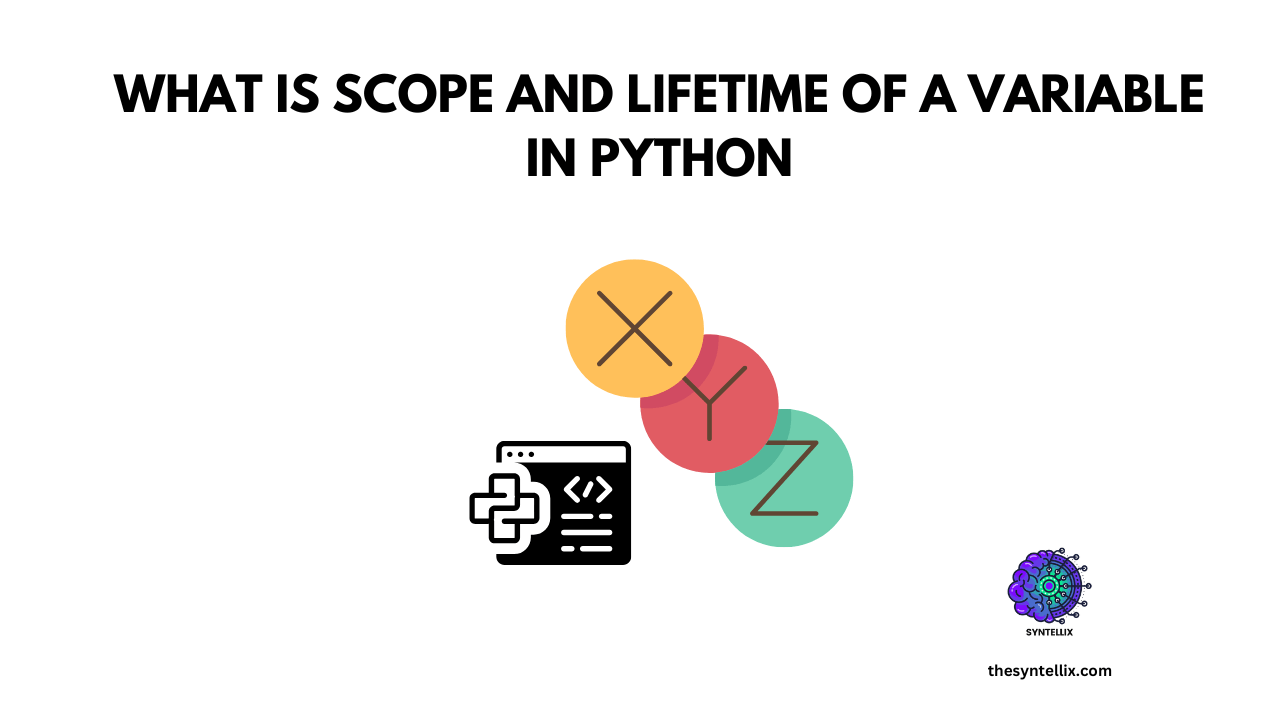If you are learning Python, it is important to understand what is scope and lifetime of a variable in Python. These two concepts tell you where a variable can be used and how long it exists in your program.
In this post, we will break down these terms using clear examples so you can avoid common mistakes and write better code.
Lets gets started!
What Is Scope in Python?
Scope refers to visibility of a variable in your code and where a variable can be used. When you create a variable, Python decides how far that variable can be accessed. Python has four types of scope, often remembered by the acronym LEGB:
- Local (L) – Inside a function.
- Enclosing (E) – Inside nested functions.
- Global (G) – Defined at the top level of a file or module.
- Built-in (B) – Provided by Python itself (like
len()orprint()).
Each level tells Python where to look for a variable. Python looks in this order: Local → Enclosing → Global → Built-in.
Lets understand each using examples:
1. Local Scope
Definition: A variable defined inside a function. It is only accessible within that function.
Example:
def greet():
message = "Hello from Local!"
print(message)
greet()
# print(message) # This will cause an error because 'message' is local to greet()
Use Case: Local scope is great when you only need a variable during a specific function task, like handling user input inside a form validation function.
2. Enclosing Scope
Definition: A variable in the outer function that is used in an inner function. This is also known as a nonlocal scope.
Example:
def outer():
text = "Hello from Enclosing!"
def inner():
print(text) # Accesses 'text' from enclosing scope
inner()
outer()
Use Case: Useful in closures or decorators when the inner function needs access to the outer function variables, such as when building a function factory.
3. Global Scope
Definition: A variable defined at the top-level of a script or module. It can be accessed throughout the file (except when shadowed).
Example:
status = "Running from Global"
def show_status():
print(status)
show_status()
Use Case: Useful for configuration settings or constants like API_KEY = "123abc" that need to be accessed by multiple functions.
4. Built-in Scope
Definition: Names that are built into Python itself, like len, print, or sum.
Example:
print(len([1, 2, 3])) # 'print' and 'len' are built-in functions
Use Case: These are Python’s default tools. Avoid overriding them. For example:
# BAD PRACTICE: Don't do this!
sum = 10
print(sum([1, 2, 3])) # Error: 'int' object is not callable
Summary of the scope of the variable
| Scope | Level | Where it’s Defined | Accessibility |
|---|---|---|---|
| Local | 1 | Inside the current function | Only within that function |
| Enclosing | 2 | In a parent function (nested scope) | Inner functions of the parent |
| Global | 3 | At the top of the script/module | Anywhere (unless overridden) |
| Built-in | 4 | Python’s standard library | Always available |
What Is the Lifetime of a Variable in Python?
Lifetime is about how long a variable stays in memory during the program run. The lifetime of variable begins when it is created and ends when it is no longer needed.
- Local variables (inside a function) only live while the function runs.
- Global variables live as long as the program runs.
Example:
def show():
count = 5 # count exists only while show() runs
print(count)
show()
After show() finishes, count is gone. Python automatically clears it from memory. So, if you are wondering about python var scope and lifetime they go hand in hand: scope defines where, lifetime defines how long.
Global Variables in Python
A global variable is one you create outside of a function. It can be accessed from anywhere in your code. But if you want to change a global variable inside a function, you must use the global keyword.
x = 10 # Global variable
def update():
global x
x = 20
update()
print(x) # Output will be 20
Without the global keyword, Python will treat x as a new local variable inside update().
These concepts are important when working with python declaring global variables and managing python scope effectively.
Scope vs Lifetime:
| Feature | Scope | Lifetime |
|---|---|---|
| Definition | Where the variable can be used | How long the variable exists |
| Starts at | Time of declaration | Time of creation |
| Ends at | When it goes out of scope | When the function/module ends |
| Example | Local, global | Function-end, program-end |
Understanding both helps to avoid bugs like variables not found or using wrong values.
Common Mistakes to Avoid
Here are a few issues beginners face when working with python scope and variable lifetime:
- Using variables outside their scope.
- Forgetting to use
globalfor updates. - Overusing global variables.
- Accidentally shadowing variables in nested functions.
Make sure to keep your variables well-defined and contained, especially when writing larger scripts or working in teams.
Best Practices for Python Variable Scope
To write clean and safe code:
- Use local variables whenever possible.
- Keep global variables to a minimum.
- Name variables clearly to avoid confusion.
- Use comments to explain variable use in complex scopes.
- Test your code often to catch scope-related bugs early.
Conclusion:
Understanding what is scope and lifetime of a variable in Python helps you write better, bug-free code. Scope controls where a variable is accessible, and lifetime controls how long it exists. These two together shape how Python manages memory and logic.
Whether you are managing global variables in Python or writing tight loops, keep scope and lifetime in mind and your programs will thank you!
Explore further into the fascinating world of python by reading my main pillar post: Python For AI – My 5 Years Experience To Coding Intelligence
To Run, Generate, Explain, and Troubleshot Python code use our free AI Python Coding Assistant.
FAQs
What is python var scope?
Python var scope refers to where a variable can be accessed in your code. It depends on whether the variable is local, global, or inside a nested function.
How does Python handle global variables?
Python allows global variables to be accessed from any function, but to modify them inside a function, you must use the global keyword.
What is the lifetime of a local variable?
A local variable’s lifetime lasts only during the function execution. After the function ends, Python removes the variable from memory.
Can I reuse a variable name in different scopes?
Yes. A variable named x inside a function is different from x outside the function. These are called different scopes.
What happens if I use a variable before declaring it?
Python will raise a NameError. Always declare your variables before using them.

Stay ahead of the curve with the latest insights, tips, and trends in AI, technology, and innovation.

